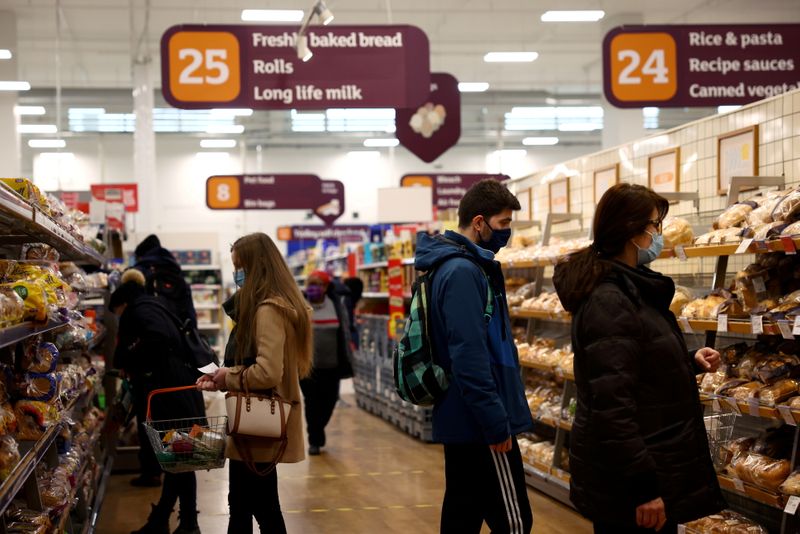By Abhinav Ramnarayan and Tommy Wilkes
LONDON (Reuters) - Britain looks like one place where investors urgently need a hedge against inflation, yet many say trade in domestic bonds designed with that in mind is overstating the price pressure so much that they have become too expensive to consider.
Inflation-linked government bonds come into favour when prices rise because their principal and interest payments go up and down as prices change.
Interest in them in Britain - including from what one securities trader dubbed "inflation tourists" - has soared as labour and goods shortages have fanned inflation fears.
Even in normal times, British linkers enjoy huge demand from local pension funds, especially the defined benefit schemes that promise to account for inflation when they pay out. That drives yields lower and raises breakevens - the implied inflation rate.
They pay a return linked to the retail price index (RPI) rather than the consumer price index used by the Bank of England. Because the RPI tends to be 0.8% to 1% above CPI, inflation expectations must be accordingly dialled down.
But even after accounting for that gap, fund managers say they are being forced to seek the same protection overseas as the UK market, with investors positioned for lower inflation having also already been squeezed out, becomes ever more detached from fundamentals
One-year indexed linked gilts currently imply a 5.8% inflation rate while five-year linkers show it at 4%.
The BoE expects consumer price inflation to rise briefly above 4% in late 2021 and then subside.
The poor value for money in the linker market is especially the case, investors say, given recent aggressive repricing of tighter BoE policy in the British government bond market.
Two-year UK yields are up 42 basis points in the past month and a half, while U.S. 2-yr yields are 14 bps higher and German ones just 5 bps.
DEMAND/SUPPLY IMBALANCE
"It's too rich a premium for us. There are cheaper options out there," said John Taylor, co-head of European fixed income at AllianceBernstein (NYSE:AB).
As inflation expectations rose, Taylor sold British government bonds, adding exposure to inflation-linked bonds in Australia and the United States where pricing does not look so out of kilter.
UK 2-year 2-year forward inflation swaps predict a 4% inflation rate, double the BoE target and up from around 3.83% at the start of September.
The U.S. and euro zone equivalents, at 2.77% and 1.78%, have moved even more, but both remain much closer to their central banks' inflation targets.
Royal London Asset Management's Head of Alpha Strategies, Paul Rayner, has also dumped UK linkers in favour of Australian, U.S. and euro zone inflation-linked bonds, as well Japanese, where breakevens are close to zero.
These offer better ways to position for rising British and global inflation, Rayner said, calling UK linkers "extremely overvalued".
According to one inflation securities trader at a major bank, part of the breakeven surge is down to "inflation tourists" - investors not typically involved in the market but who suddenly want protection.
That's exacerbated the demand/supply imbalance in a market where some 1.7 trillion pounds ($2.3 trillion) of inflation-linked mostly pension fund liabilities chase products worth less than 500 billion pounds.
"That sort of camp adds pressure for breakevens to go higher and that typically means headline inflation will start peaking and then reversing," the trader added.
Assets held in sterling inflation-linked bond funds domiciled in Europe - a proxy for the wider linker market - reached 16.9 billion euros in August, just shy of the previous month's record high, Morningstar data shows.
In the first eight months of 2021 they received 876 million euros of net cash, the biggest haul since 2017.
Graphic: UK breakeven inflation soars https://fingfx.thomsonreuters.com/gfx/mkt/myvmngoxypr/breakeven%20inflation%20oct%2012.png
INFLATED EXPECTATIONS
Fahad Kamal, chief investment officer at Kleinwort Hambros, said inflation expectations had been "massively above what actually happened" for years. Slowing growth and demographics "are far bigger forces than the short-term supply issues which markets get excited about."
"Likely, it is overstating inflation by a couple of percentage points, based on historical averages," said Kamal, who has turned to U.S. securities for a "far better gauge of global inflation pressures."
Others including Savvas Savouri, chief economist at Toscafund Asset Management, reckon the CPI basket itself needs overhauling as it doesn't account for the deflationary impact of technology.

While linkers imply CPI of 3.2% in five years time, he expects actual readings to be 2%-2.5%.
($1 = 0.7355 pounds)